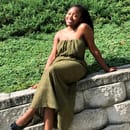As I learned that the East Pittsburgh Officer Michael Rose will not be charged in the murder of Antwon Rose Jr this morning, my heart was heavy. Again, another event where an unarmed African-American has been murdered at the hands of the very people that are supposed to protect us. Normally, to mend my heart, I love to lose myself in all types of poetry.
In light of this event, I wanted to speak about the work of one of my favorite poets, Danez Smith. They are an amazing Black American queer poet, born and raised in St. Paul, Minnesota; however, they have family roots in both Mississippi and Georgia. Smith has accomplished many great things in their life from earning a Bachelors of Arts from the University of Wisconsin-Madison to becoming a great author to winning many awards. During their time at the University of Wisconsin-Madison, they were a First Wave Urban Arts Scholar. Afterward, they attained a Master of Fine Arts from the University of Michigan.
Smith wrote the book Don’t Call Us Dead in 2017 where they showcased a sequence of poetry that discovers the afterlife for Black men murdered by the police. The afterlife that is full of safety, love, and bliss instead of what they were given on this Earth. A life that they should have had on Earth, not only when they are in the ground. In their book of poetry, they also unleash the truth behind what Black people have to endure behind closed doors on a personal level. Our experiences in our skin, body, and blood. This book was a well-deserved finalist for the National Book Award.
Smith was also the winner of the Lambda Literary Award, the Kate Tufts Discovery Award and the chapbook hands on ya knees. They has also received many fellowships including: from the McKnight Foundation, Cave Canem, and Voices of Our Nation (VONA). Smith is a founding member of the multigenre, multicultural Dark Noise Collective with Fatimah Asghar, Franny Choi, Nate Marshall, Aaron Samuels, and Jamila Woods.
Their writing has appeared in many magazines and journals, such as Poetry, Ploughshares, Beloit Poetry Journal, and Kinfolks. For their poetry, Smith was a 2011 Individual World Poetry Slam finalist and the reigning two-time Rustbelt Individual Champion and was on the 2014 championship team Sad Boy Supper Club. In 2014, they were the festival director for the Brave New Voices International Youth Poetry Slam and was awarded a Ruth Lilly and Dorothy Sargent Rosenberg Poetry Fellowship from the Poetry Foundation.
In February 2016 Smith and Jamile Woods joined Macklemore for a performance on The Late Show with Stephen Colbert. Their writing has been published in Poetry, the magazine, and Ploughshares. In March 2017, Smith was the inaugural guest of the Alexander Lawrence Posey Speaker Series at the University of Central Oklahoma. Lastly, Smith won a 2017 National Endowment for the Arts grant. They is currently a co-host of the Poetry Foundation’s podcast, “VS.”
Just reading about their history made me extremely interested in their poetry. They are doing what they love, beating all odds. Danez Smith has accomplished so much at such a young age. Not only that, but their work is genuine. Their poetry heals and soothes souls. It gives social advocates a reason to fight by validating our cause. We are constantly told that our cause is irrelevant. That police violence on Black people is deserved. It is false that Black people are unfairly represented in the media. What about Black on Black crime? We deserve and want justice for Trayvon Martin, Stephon Clark, Sandra Bland, Amadou Diallo, Manuel Loggins Jr., Ronald Madison, Kendra James, Sean Bell, Eric Garner, Michael Brown, Alton Sterling and the many more unarmed Black people that are killed at the hands of the people because they were “a threat.” The hands that are supposed to protect them. This is what Smith conveys in their poetry.
Their first poem in their book Don’t Call Us Dead, is called “summer, somewhere.” Their line “history is what it is. it knows what it did” shows that history can not be changed no matter how hard people want to deny it or fabricate it, to make it seem less terrible. However, nobody can seem to get history to admit the truth. People rather just act like it did not happen and deny the harshness of slavery and segregation. By Smith saying “i won’t get started” shows how powerful their poems and poetry itself is.
We have had point out the truths of police brutality too many times to ignorant people who won’t even bat an eye. Or try to open up their minds to the truth. Their poems can make people feel and live through the body of Black man. For people to understand how it feels to constantly be a target. However, having to repeat yourself over and over gets tiring, but their poems have “the force of a restorative imagination.”
Their verse: “in the catalogue of ways to kill a black boy, find me/ buried between the pages stuck together/ with red stick. ironic, predictable. look at me.” demonstrates how Black men are depicted on the news. We are “buried” among negative news, never showing our accomplishments. We never have the opportunity to live the life we want or even any free life at all. To avoid being murdered by the police, we have to calculate every step and move we make. In their last line “look at me,” just shows how Smith feels he is next in line and just waiting their turn to be another statistic, to be used, discarded and just another victim of an ignorant society.
While normally the use of the word “boy” is normally associated with innocence, Smith makes it clear that Black boys innocence is stripped away as soon as they exit the womb. According to this poem, the will of the boy is basically the will of the wind. Although, not used in the same context as Robert Frost. Black boys can only go one way in life. Any attempts to disobey society and try to head in another direction can lead to their death sentence. However, Smith tries to bring that imagination.
Going back to their title, it has to be summer somewhere. The journey that Black people have to take cannot be all grim and cloudy. We have to find and embrace our sunshine by being guarded through prayer and performing small acts of innocence. This is why I love their line: “we go out for sweets & come back.” Because we will come back even stronger.
Smith’s poetry is so raw and real. He wants to repair and sustain communities, to try to make the world a little more bearable. Over the course of reading poetry, I have realized that many time poets only reveal one side of themselves or one part of their life. Most of the time they are writing for themselves. Smith’s poetry is not limited to one aspect of their life, Smith’s poetry speaks to Black Americans daily lives and how they feel walking down the block to the corner store. Not just any Black American, but Black Americans that are outcasted by their own community, Smith wants to share their gifts with them. Smith puts the raw version of theirself out there as an African-American, H.I.V.-positive, genderqueer artist.
*Here is the link for “summer, somewhere” https://www.poetryfoundation.org/poetrymagazine/poems/58645/from-summer-…



